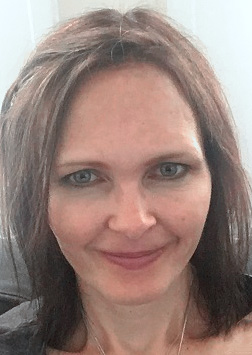

 The browser is now a full fledged platform for apps. The major benefits of using the browser as a platform includes ease of universal deployment and avoiding concepts such as having to install software. It's also a very flexible and powerful environment. Increasingly consumer electronics "devices" are software applications... Today's PWAs (Progressive Web Apps) go further. They take advantage of HTML5 and also capabilities of the JavaScript environment.
The browser is now a full fledged platform for apps. The major benefits of using the browser as a platform includes ease of universal deployment and avoiding concepts such as having to install software. It's also a very flexible and powerful environment. Increasingly consumer electronics "devices" are software applications... Today's PWAs (Progressive Web Apps) go further. They take advantage of HTML5 and also capabilities of the JavaScript environment.
 I recently served on a panel at the Toronto RightsCon 2018 conference (Making Safe Online Access to Affordable Medication Real: Addressing the UN Human Rights resolution for access to essential medicines), where I represented the perspective of Americans struggling to afford their daily medications and desperate to have safe, affordable Internet access to their prescriptions.
I recently served on a panel at the Toronto RightsCon 2018 conference (Making Safe Online Access to Affordable Medication Real: Addressing the UN Human Rights resolution for access to essential medicines), where I represented the perspective of Americans struggling to afford their daily medications and desperate to have safe, affordable Internet access to their prescriptions.
 The Google-run .app TLD was always destined to draw attention and scrutiny, from the moment it fetched a then-record ICANN auction price of $25 million. Since it reached General Availability in May it has gained more than 250,000 registrations making it one of the world's most successful TLDs. However perhaps more interesting was Google's choice to add the .app TLD and its widely used .google extension to the HTTP Strict Transport Security (HSTS) Top-Level Domain preload list, offering an unprecedented level of security for all domains under .google and .app.
The Google-run .app TLD was always destined to draw attention and scrutiny, from the moment it fetched a then-record ICANN auction price of $25 million. Since it reached General Availability in May it has gained more than 250,000 registrations making it one of the world's most successful TLDs. However perhaps more interesting was Google's choice to add the .app TLD and its widely used .google extension to the HTTP Strict Transport Security (HSTS) Top-Level Domain preload list, offering an unprecedented level of security for all domains under .google and .app.
 25 years ago, on April 22, 1993, a software release happened that fundamentally changed the user experience of the Internet. On that day, version 1.0 of "NCSA Mosaic for the X Window System" was released. You could now have (gasp!) text MIXED WITH IMAGES on the same page! Reading the Mosaic 1.0 release notes from Marc Andreessen is a bit of fun, as it includes gems like "Fixed mysterious stupid coredump that only hits Suns."
25 years ago, on April 22, 1993, a software release happened that fundamentally changed the user experience of the Internet. On that day, version 1.0 of "NCSA Mosaic for the X Window System" was released. You could now have (gasp!) text MIXED WITH IMAGES on the same page! Reading the Mosaic 1.0 release notes from Marc Andreessen is a bit of fun, as it includes gems like "Fixed mysterious stupid coredump that only hits Suns."
Digital Transformation (DX) is picking up speed. According to a recent announcement by IDC, the market is expected to grow at a Compounded Annual Growth Rate (CAGR) of 17.9% to reach a whopping 321 billion dollars by 2021. In 2018 alone, IDC expects that 326 billion will be spent on transforming how people and things communicate. Based on these numbers, it looks like Digital Transformation has become the real deal.
 The current revelations about Cambridge Analytica's use of Facebook data illustrate an important drawback to using a Facebook account as your business' online presence: Facebook knows and sells your customers! Millions of companies - especially small companies and start-ups - rely on a Facebook account for their online presence. On the surface, it seems like a great idea...
The current revelations about Cambridge Analytica's use of Facebook data illustrate an important drawback to using a Facebook account as your business' online presence: Facebook knows and sells your customers! Millions of companies - especially small companies and start-ups - rely on a Facebook account for their online presence. On the surface, it seems like a great idea...
 Unicode's goal, which it meets quite well, is that whatever text you want to represent in whatever language, dead or alive, Unicode can represent the characters or symbols it uses. Any computer with a set of Unicode typefaces and suitable layout software can display that text. In effect, Unicode is primarily a typesetting language. Over in the domain name system, we also use Unicode to represent non-ASCII identifiers. That turns out to be a problem because an identifier needs a unique form, something that doesn't matter for typesetting.
Unicode's goal, which it meets quite well, is that whatever text you want to represent in whatever language, dead or alive, Unicode can represent the characters or symbols it uses. Any computer with a set of Unicode typefaces and suitable layout software can display that text. In effect, Unicode is primarily a typesetting language. Over in the domain name system, we also use Unicode to represent non-ASCII identifiers. That turns out to be a problem because an identifier needs a unique form, something that doesn't matter for typesetting.
 The regulatory environment for brands and retailers that do business online is getting stricter thanks to regulatory changes in Europe with the General Data Protection Regulation (GDPR), as well as existing regulations in the U.S. Companies that adapt quickly can turn these changes into a competitive advantage. As we grapple worldwide with the implications of the incredible amount of personal data generated every day, consumers are pressuring brands and legislators alike for more control over their information.
The regulatory environment for brands and retailers that do business online is getting stricter thanks to regulatory changes in Europe with the General Data Protection Regulation (GDPR), as well as existing regulations in the U.S. Companies that adapt quickly can turn these changes into a competitive advantage. As we grapple worldwide with the implications of the incredible amount of personal data generated every day, consumers are pressuring brands and legislators alike for more control over their information.
 If you visit Marriott's China website today, you're likely to see this (see screenshot). I dumped the text within this page into Google Translate and included below is what it loosely said. So what exactly happened here? Marriott sent a survey in Mandarin to its Chinese loyalty members that referred to Tibet, Macau, and Taiwan as "countries." As readers of this site might know quite well by now, in the eyes of Chinese authorities, this is no trivial oversight.
If you visit Marriott's China website today, you're likely to see this (see screenshot). I dumped the text within this page into Google Translate and included below is what it loosely said. So what exactly happened here? Marriott sent a survey in Mandarin to its Chinese loyalty members that referred to Tibet, Macau, and Taiwan as "countries." As readers of this site might know quite well by now, in the eyes of Chinese authorities, this is no trivial oversight.
 After its initial launch in 2016 and with over 1,800 domains registered, the .tube TLD recently released over 25,000 previously reserved domains as part of a broader re-launch of its business and brand. I spoke with Rami Schwartz, Founder and CEO of .tube about the journey so far and about what's in store for .tube in the New Year... "We're used to fighting against companies much larger than us and prevailing - our history has seen us come up against the likes of the Mexican Government and Google..."
After its initial launch in 2016 and with over 1,800 domains registered, the .tube TLD recently released over 25,000 previously reserved domains as part of a broader re-launch of its business and brand. I spoke with Rami Schwartz, Founder and CEO of .tube about the journey so far and about what's in store for .tube in the New Year... "We're used to fighting against companies much larger than us and prevailing - our history has seen us come up against the likes of the Mexican Government and Google..."